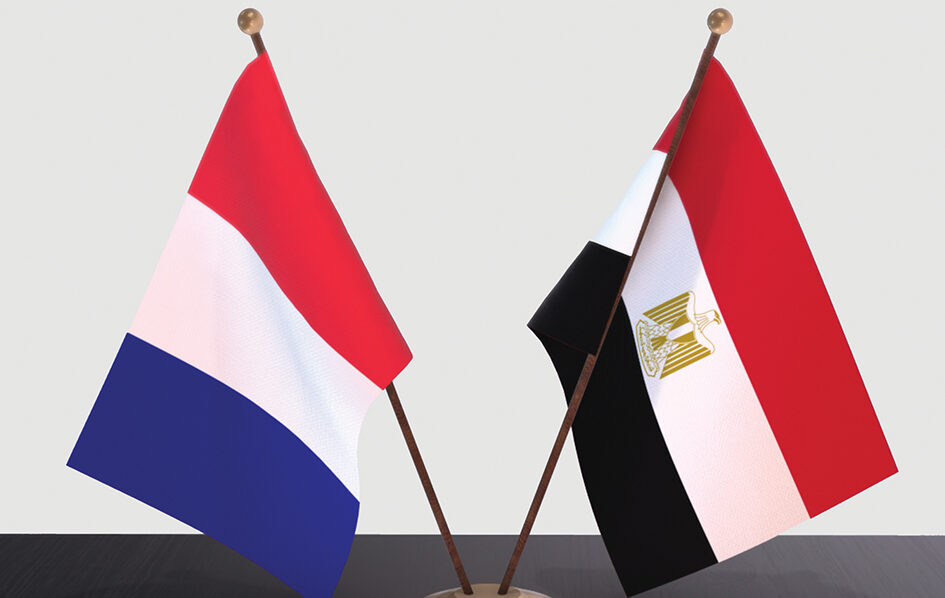In light of French President Emmanuel Macron’s three-day visit in April, he and Egypt’s President Abdel Fattah el-Sisi focused on deepening economic and political ties. According to Élysée Palace, the official residence of the French president, Macron aims to “build a strategic partnership between Egypt and France, similar to Egypt’s existing collaboration with the European Union.”
French interest in Egypt extends beyond its large and youthful market; Egypt also holds strategic potential for France to enhance its influence across Africa. “Egypt can serve as a key gateway for major French companies looking to access African markets, leveraging Egypt’s advanced digital infrastructure and strategic geographical position,” Karima El-Hakim, country director of investment firm Plug and Play, said during the Egypt-France Business Forum in April.
The visit comes as Egypt grapples with local and regional challenges due to the ongoing war in Gaza and disruptions to the Red Sea’s southern entrance. Macron emphasized investing in Egypt is vital, viewing it as a stable country with significant growth potential. “I [want] to reaffirm France’s commitment to ensuring the stability of Egypt, given the context of a worsening climate in the region and as the Egyptian economy faces challenges,” said Macron.
Similarly, Egypt realizes the necessity of diversifying its economic partners. “The state is working to diversify export markets in the framework of a strategy to expand Egyptian markets in Africa, Europe, Asia, and North America to reach $145 billion in annual exports,” Hassan Al-Khatib, Minister of Investment and Foreign Trade, said in January.
French FDI is likely to boost Egypt’s exports as well as address local demand. “French companies operating in Egypt are active across a wide range of sectors and are looking to expand their presence beyond the local market, targeting opportunities in both African and Middle Eastern markets,” Didier Boulogne of the French Ministry for Foreign Trade noted during the Forum.
Bilateral trade
French-Egyptian trade relations have been historically volatile. In 2017, trade between the two nations surged by 21.8%, reaching EUR 2.5 billion, according to French customs data. This growth followed a significant decline in 2016, when trade dropped by 27.5% to EUR 2 billion, marking the largest decrease in a decade.
As per Central Bank of Egypt data in October, France ranked 13th among Egypt’s biggest trading partners during the first nine months of FY 2023/24, with bilateral trade volume reaching $1.8 billion. Of that, $1.164 billion were imports and $646 million in exports.
By the end of 2024, bilateral trade had jumped significantly to $2.9 billion, according to the Central Agency for Public Mobilization and Statistics (CAPMAS) in April.
In 2024, Egyptian exports to France surged to $1 billion, according to the State Information Service (SIS) in April. Leading exports included electrical machinery and equipment ($248 million), fertilizer ($194 million), mineral fuels and oils ($158 million), vegetables and fruits ($75 million), and ready-made garments ($73 million).
Egyptian imports from France were valued at $1.8 billion in 2024, compared to $1.7 billion the previous year. Main French exports to Egypt were pharmaceutical products ($302 million), grain ($183 million), vehicles, tractors, and motorcycles ($115 million), iron and related products ($100 million), and miscellaneous chemical products ($99 million).
French FDI
While trade with France performed positively, bilateral investment showed signs of contraction. French investments in Egypt decreased to $483.8 million in the 2023/2024 fiscal year, down from $591.3 million in the previous fiscal year.
Similarly, Egyptian investments in France declined to $238.3 million in 2023/2024 compared to $284.2 million in 2022/2023, according to the SIS, which stressed: “the growing strength of the economic partnership between the two countries, even as investment flows experienced a temporary slowdown.”
As it stands, France remains a key strategic partner, with investments in Egypt exceeding $7 billion and contributing to the creation of more than 50,000 job opportunities through more than 180 French companies, Hossan Heiba, CEO of the General Authority for Investment and Free Zones (GAFI), noted during the Forum.
Visit gains
Macron’s visit to Egypt was multifaceted, bringing French expertise and technology to support Egypt’s development plans. “We count on France’s technological progress to help localize industries in Egypt, reducing pressure on foreign currency and supporting the Egyptian economy, particularly in agriculture, tourism, healthcare, and beyond,” said el-Sisi.
Macron toured and rode the Cairo Metro, one of Egypt and France’s most significant joint projects. In 2022, Egypt’s National Authority for Tunnels signed a 15-year, EUR 1 billion agreement with Régie Autonome des Transports Parisiens, operator of the Paris Metro, to manage the Cairo Metro’s third line. In addition, France has supported the upgrade of Metro Line 1 and the development of the Tanta–Mansoura–Damietta railway.
Building on previous contributions, the two governments signed an MoU to continue cooperating on Cairo Metro Line 6, for which an action plan was signed in December.
Under the action plan, French consulting firm Egis and Setec will submit the necessary technical specifications for the project to the National Authority for Tunnels for review, according to a statement.
In addition, French rolling stock manufacturer Alstom is set to present its technical and financial proposals to the government. The new 38.6-kilometer line will have 26 stations. It aims to reduce congestion on Line 1 and will link Shubra El Kheima in the north to New Maadi in the south.
In the health sector, Christelle Saghbini, head of Pharma International, general medicines at Sanofi, underscored the role of Egypt as “a strategic hub for the company in Africa.” She highlighted that 73% of Sanofi’s products are manufactured in Egypt in partnership with local companies.
Four cooperation agreements were signed between the Ministry of Health and Sanofi during Macron’s visit. The first aims to raise vaccine awareness in underserved areas, according to the SIS.
The second targets diabetes care with nationwide campaigns, educational content for children, nurse training, and a digital platform for remote monitoring.
The third agreement will focus on rare diseases, aiming to increase awareness and reduce genetic disorders through campaigns, field training, and educational events. Additionally, a contract with the Gustave Roussy Institute will support the development of a specialized cancer treatment center in Cairo.
French grants
Alongside trade and investment, France was also keen to support Egypt’s economic growth efforts. Egypt, France, and the EU signed nine financing and grant agreements worth 262 million euros to implement priority projects in Egypt in transport, health, water, and energy.
The grants include a concessional financing agreement of EUR 50 million from the French Development Agency (AFD) and EUR 10 million from the EU for the regional control center project in Alexandria. The AFD will manage the EU grant for the Ministry of Electricity and Renewable Energy.
The project aims to deliver stable, high-quality electricity to Alexandria residents and modernize the control facilities of the electricity grid in one of Egypt’s most densely populated regions.
Financing and grant agreements also were signed for a new wastewater treatment plant project in East Alexandria, including EUR 68 million from the AFD and EUR 2 million grant for the Ministry of Housing, Utilities, and Urban Communities. The project aims to serve 1.5 million people after the first phase’s completion in 2032.
Another wastewater treatment financing and grant agreement was signed for the Al-Gabal Al-Asfar project, with funding from AFD of EUR 50 million. Grants of EUR 1.5 million from the AFD and EUR 10 million from the EU will be managed by AFD for the Ministry of Housing, Utilities, and Urban Communities.
Gateway to Africa
Egypt is building momentum, drawing in global investors. “As Africa’s top destination for foreign direct investment, Egypt is determined to be the gateway for investors seeking entry into African markets,” Heiba noted in February at the Egypt-Zambia Business Forum.
Heiba said Egypt attracted foreign direct investment (FDI) of $46.6 billion last year, up from $10 billion in 2023, reflecting the growing confidence of the international community in the Egyptian economy.
He emphasized the government’s ambitious goals, including “attracting $60 billion of foreign direct investment (FDI), increasing the value of exports to $145 billion, and raising the private sector’s contribution to 65% of total investments by 2030.”
Egypt receives 18.6% of Africa’s total foreign direct investments, estimated at $52.6 billion in 2023, according to the UN Conference on Trade and Development.
This global interest has been bolstered by government efforts to enhance the country’s investment climate. Over the past 10 years, “large sums of money have been spent on basic infrastructure in the fields of energy and roads, and many legislative and economic reforms have been introduced in all sectors,” el-Sisi said during Macron’s visit. “Mega companies seeking to operate in Egypt will enjoy a developed infrastructure.”
With a population of more than 106 million, where 60% are under 40, el-Sisi said, the country offers abundant opportunities for businessmen and investors.
In addition to being a large market, Egypt has 12 trade relations and agreements with African countries and others in the region. CAPMAS data from November showed Egypt’s total trade with African Union countries reached $9.2 billion in 2023. By 2025, the government aims to raise Egyptian exports to Africa to $10 billion.
Meanwhile, Egypt’s vast economic potential within the African continent can also help overcome the global economic turmoil. “Egypt can mitigate the impact of Western tariffs by strengthening its engagement with regional trade blocs like the African Continental Free Trade Area (AfCFTA) and the Common Market for Eastern and Southern Africa (COMESA),” Dina Samir ElWakkad, an economics instructor and economist, told Arab Finance in April. “These platforms offer access to new markets and can help diversify export destinations, reducing reliance on Western economies.”




